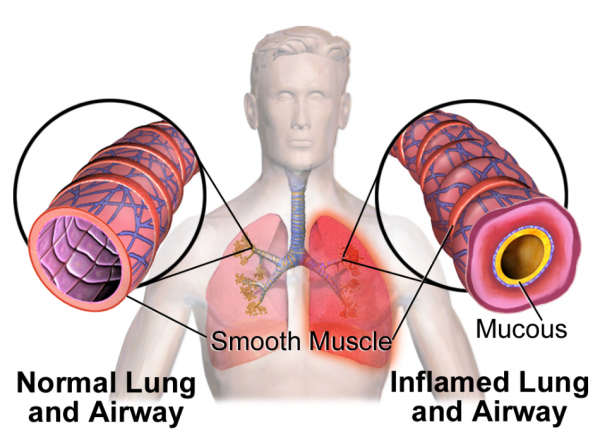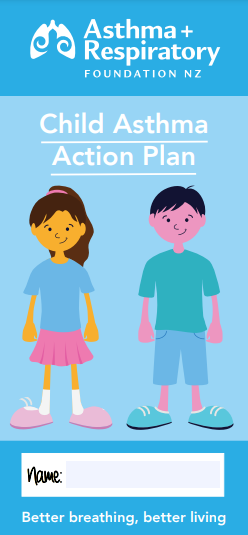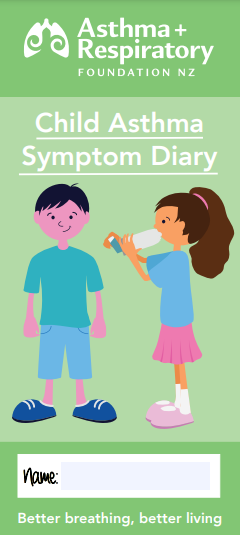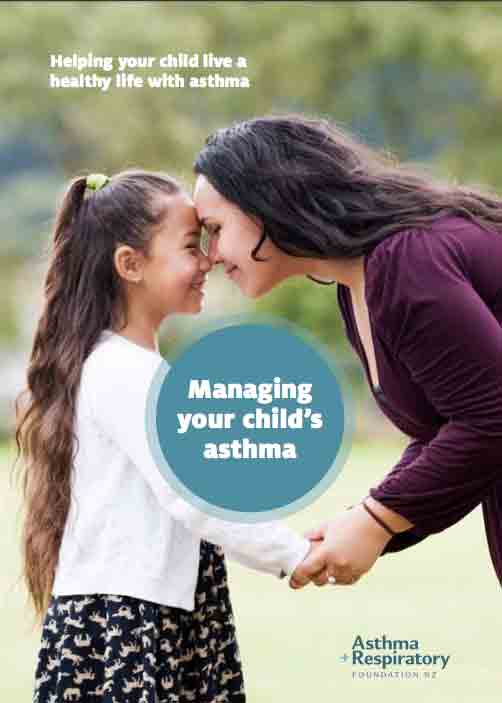Asthma in children | Mate huango tamariki
Key points to remember about asthma in children
- Asthma is a condition that leads to narrowing of the airways of the lungs.
- Symptoms include wheeze, cough and difficulty breathing.
- Common asthma triggers are colds (viruses), exercise, dust, pollens and cigarette smoke.
- This page focuses on asthma in children. See asthma in adults for more information about adults.
- The content on this page comes from KidsHealth(external link).

Asthma is a common breathing condition. It affects the small and medium-sized airways (bronchi) in the lungs.
In asthma, your child's airways are inflamed and there is:
- swelling of the airway wall
- an increase in mucus or phlegm
- tightening of the muscle in the airway wall.
These changes cause narrowing of your child's airways. This leads to wheezing, cough and difficulty with breathing.
Wheezing is a musical, whistly sound that tamariki make, usually when breathing out. It can also happen when they breathe in. The sound comes from their chest, not from their nose or throat.
The image below shows a normal airway and the airway of a person with asthma.

Image credit: Blausen Medical Gallery 2014 via Wikimedia Commons(external link)
One in 4 tamariki in Aotearoa New Zealand will have asthma at some time during childhood. It's not clear why some children have asthma when others don't.
Asthma in children is more likely if:
- a mother smoked during pregnancy
- a child has eczema, hay fever or allergies
- there is asthma in the family – parent, brother or sister
- one or both parents have an allergic condition, eg, asthma, hay fever or eczema.
Modern Western lifestyle may play a part in the rise in asthma that has happened over the last few decades. Changes in housing, diet and a more hygienic environment may contribute. Outdoor environmental pollution may make asthma symptoms worse but it doesn't actually cause asthma. Experts continue to study the reasons for the increase in asthma.
Tamariki and rangatahi with asthma have airways that are sensitive and react to certain triggers. Some children have asthma all year round. Others may only have it in certain seasons or situations.
Things that can cause an attack include the following:
- Infections: Viruses like colds and the flu can cause some children to have worse asthma symptoms which may lead to an asthma attack.
- Allergies: If your child is allergic to things like pollens, grass, dust or pet fur, this can worsen their asthma.
- Irritants: Irritants may trigger asthma attacks. Examples or irritants are air pollution, car exhaust, vapours and mouldy environments.
- Tobacco smoke: Tobacco smoke can trigger asthma attacks and can make your child's asthma symptoms worse. All tamariki need a smoke-free environment, wherever they happen to be.
- Exercise: Exercise and physical activity are a big part of helping tamariki stay healthy and fit. Exercise is also an important part of asthma management. But, sometimes exercise or activity can trigger an episode of asthma.
-
Changes in the weather: Some children may find a change in the weather or certain conditions, like cold or damp weather, can make their asthma worse.
Medicine
Some tamariki need to be on a preventer medicine.
See our page on the different types of asthma medicines and when to use them.
Other things that can help your child's asthma include:
- living in a smoke-free environment at all times
- keeping your house warm and dry
- where possible, avoiding things that trigger their asthma.
Be smoke-free
Make sure your child's environment is smoke-free, wherever they happen to be. Asthma increases in tamariki whose parents smoke. Tobacco smoke also triggers asthma attacks and makes a child's asthma more severe. Many environmental factors contribute to asthma. Cigarette smoke is one that you can avoid.
If you want to give up smoking:
- call the free Quitline on 0800 778 778 or text 4006
- check out the Quitline | Me Mutu website(external link)
- ask your healthcare provider for support.
Keep your house warm and dry
Check out our useful tips for keeping your home warm and dry.
Keep a symptom diary and a record of possible triggers
Asthma symptoms and triggers may differ from child to child and from time to time. It is useful to know your child's triggers. Use a symptom diary to keep a record of possible triggers.
You should see your healthcare provider and ask about asthma if your child:
- wheezes and coughs with a cold (virus)
- wheezes and coughs after exercise
- wheezes and coughs during the night
- can't keep up when they're running around with children of the same age
- says they are out of breath or breathless
- complains they feel tired or asks you to carry them (depending on their age) when you go for a walk
- doesn't run around as much as other children of the same age.
These are some of the symptoms of asthma in children, but they may also be due to other less common conditions. Talk to your healthcare provider about them.
Asthma medicines
Read about different types of asthma medicines.
Online learning tool
You can use the Asthma + Respiratory Foundation NZ's online learning tool(external link) to learn more about how you can help children with asthma stay fit, healthy and happy.
Booklets to download
You can read the following translated booklets alongside the online learning tool above.
Read a booklet about managing your child's asthma in te reo Māori (PDF, 3.06 MB)(external link)
Read a booklet about managing your child's asthma in English (PDF, 3.59 MB)(external link)
Read a booklet about managing your child's asthma in Samoan (PDF, 3.05 MB)(external link)
Videos to watch
You can also watch some videos from KidsHealth NZ about managing asthma in children and young people(external link).
Find out about mild, moderate and severe asthma attacks and what to do if your child has one(external link), on KidsHealth NZ.
There also some asthma apps that have been reviewed by Healthify.
Image credit: Asthma and Respiratory Foundation NZ(external link)
Apps reviewed by Healthify
Asthma is a long-term condition. The majority of children with asthma have less troublesome asthma as teenagers. Symptoms can appear again in adulthood. If your child has severe asthma, it's more likely to continue or return in later life.
Your child should learn about asthma and gradually take over responsibility for its management, as they become a teenager, with support from you. Read more about asthma in adults.
Asthma New Zealand(external link) See a range of asthma topics at the Asthma New Zealand brochures page.(external link)
Asthma + Respiratory Foundation – child asthma action plan(external link) An asthma action plan to be completed with your child's healthcare provider. It includes how to use a spacer, how to clean an inhaler, and actions to take for different stages of asthma - from well, worse to worried.
Information about asthma (The Sydney Children's Hospitals Network)(external link) See the resource pack on asthma and your child for parents and carers(external link). These are Australian resources so may include content which is not relevant to a NZ audience.
Information about asthma (Royal Children’s Hospital, Melbourne)(external link) See the asthma fact sheet produced by the Royal Children's Hospital, Melbourne.
Asthma and your child (Asthma UK)(external link) Take a look at a range of topics on childhood asthma. These are British resources so may include content that is not relevant to a NZ audience.
Apps
Guidelines and clinical pathways
NZ Asthma Guidelines(external link) Quick reference guide Asthma and Respiratory Foundation NZ, 2020
NZ child asthma guidelines 2020(external link) Asthma and Respiratory Foundation NZ, 2020
Pharmacological management of asthma in children aged 5–11 years(external link) BPAC, NZ, 2020
Is it asthma? Assessing and managing wheeze in pre-school children(external link) BPAC, NZ, 2020
Asthma Control Test (external link) GSK
He māramatanga huangō – asthma health literacy for Māori children in NZ(external link) Ministry of Health, NZ
The international study of asthma and allergies in childhood(external link) The Global Asthma Network
See also Healthify's healthcare providers page on asthma in adults for guidelines and other resources for adults with asthma, and Long-term conditions for healthcare providers
Continuing medical education
eLearning
Asthma management in children(external link) Goodfellow eLearning, NZ, 2020
Podcast
Asthma in under five-year-olds(external link) Goodfellow Podcast, NZ, 2020
Dr David McNamara talks through addressing the challenges and barriers to diagnosis of asthma in the under five-year-old child.
Videos or webinars
Asthma and COPD in children updates (10 videos)(external link) PHARMAC Seminar Series, NZ, October 2015
Video: Goodfellow Unit MedTalk – paediatric asthma
"Dr Diana North, (Goodfellow Unit GP Advisor) talks with Dr David McNamara, (Paediatric Respiratory and Sleep Medicine Specialist employed at Auckland's Starship Children's Hospital) about what is new in the diagnosis and management of asthma in children up to 16 years of age." This video may take a few moments to load.
(Goodfellow Unit, NZ, 2017)
Course
Asthma and COPD Fundamentals Course(external link) Asthma & Respiratory Foundation NZ
This course aligns the latest research with specific information for the New Zealand context, such as recently funded medications, treating Māori and Pacific Peoples, and best practice health literacy. The course aligns with the latest New Zealand asthma guidelines. It includes two half day workshops covering the key aspects of COPD and asthma pathophysiology, management and practice.
Apps
Brochures

Asthma and Respiratory Foundation, NZ, 2022
English, te reo Māori, Samoan, Tongan

Asthma and Respiratory Foundation, NZ, 2022
English, te reo Māori, Samoan, Tongan
Credits: Content shared between HealthInfo Canterbury, KidsHealth and Healthify He Puna Waiora as part of a National Health Content Hub Collaborative.
Last reviewed:








